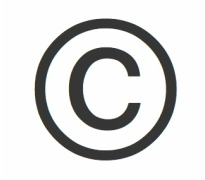 Intellectual property is one of the most valuable assets businesses (and individuals) own. There are several different forms of intellectual property, but this blog post will focus specifically on copyrights. In the United States, copyright law is based on federal laws enacted by Congress. The Copyright Act of 1976 governs copyright law and defines what can be copyrighted, what is copyright infringement, and the available remedies when there is infringement. A copyright is the exclusive legal right to copy, print, publish, perform, film, or record literary, artistic, or musical material, and to authorize others to do the same. Copyrights apply to original works in the form of a tangible medium. "Original" meaning brand new and "tangible medium" meaning in a fixed format including but not limited to: architectural works, blogs, books, choreographic works, graphic designs, photos, printed images, scripts, songs, and website content. As the author of the work and/or owner of the copyright you alone have the right to make copies of your work, distribute your work, make derivative works, perform your work publicly, display your work publicly, and make modifications to your work. These rights may be transferred or assigned in whole or in part by the author. Unless otherwise agreed in writing, work created by an employee is typically owned by the employer. As the owner of a copyright, it is generally illegal for anyone to copy, distribute, perform, or display work created by you without your permission. However, there are some exceptions and limits to your rights. And while a copyright is automatic, there are certain rights you can only get if you register with the US Copyright Office, such as the right to bring an infringement lawsuit and the ability to get statutory damages. A copyright attorney can help you register your work and protect your copyrighted work from further infringement. It is important to note copyrights do not last forever. Under the current laws, copyright protection starts from the moment of creation and continues until 70 years after the death of the author. That means that if in 2015 someone writes a song and dies in 2055, the copyright will not expire until 2125 - 70 years after 2055. If there are two or more authors of a work, then the term of copyright lasts for 70 years after the last surviving author's death. For works made for hire, and for anonymous and pseudonymous works, the duration of copyright is 95 years from publication or 120 years from creation - whichever is shorter. Once the term of a copyright expires, the work becomes apart of the public domain. When a work is in the public domain anyone can copy it and use it without permission. If you have questions about your rights as a copyright owner or a work that you are interested in protecting via copyright registration, contact the Atlanta based law firm of Simmons Rogers, LLC. |
Simmons Rogers, LLCSimmons Rogers, LLC is a full- service civil law firm based in Atlanta, Georgia. We provide legal services as well as mediation and arbitration services, to businesses and individuals throughout the state of Georgia and beyond. Archives
January 2018
Categories
All
This blog is not intended to be a complete explanation of the law. Its purpose is to inform, not to advise on any specific legal problem or legal rights. If you have specific questions regarding any topic in this blog, you are encouraged to consult the Atlanta based law firm of Simmons Rogers, LLC or an attorney licensed in your
state. |

Simmons Rogers, LLC
4045 Orchard Rd SE, Suite 210 Smyrna, Georgia 30080 Phone: 404-445-8146 Fax: 404-445-8226 E-mail: [email protected] |
LEGAL DISCLAIMER
The information on this website is for informational purposes only and is not legal advice. Use of this website does not create an attorney-client relationship between you and Simmons Rogers, LLC. You should not act upon the information within this website without seeking advice from a lawyer licensed in your own state or country. You should not send any confidential information to Simmons Rogers, LLC until and unless a formal lawyer-client relationship has been established in writing. Unless you have received such written confirmation, we will not consider any correspondence you send us as confidential. |
© 2013-2018. All Rights Reserved. Simmons Rogers, LLC
Attorney Advertising. The choice of a lawyer is an important decision and should not be based solely upon advertisements.
Privacy Policy
Attorney Advertising. The choice of a lawyer is an important decision and should not be based solely upon advertisements.
Privacy Policy

 RSS Feed
RSS Feed